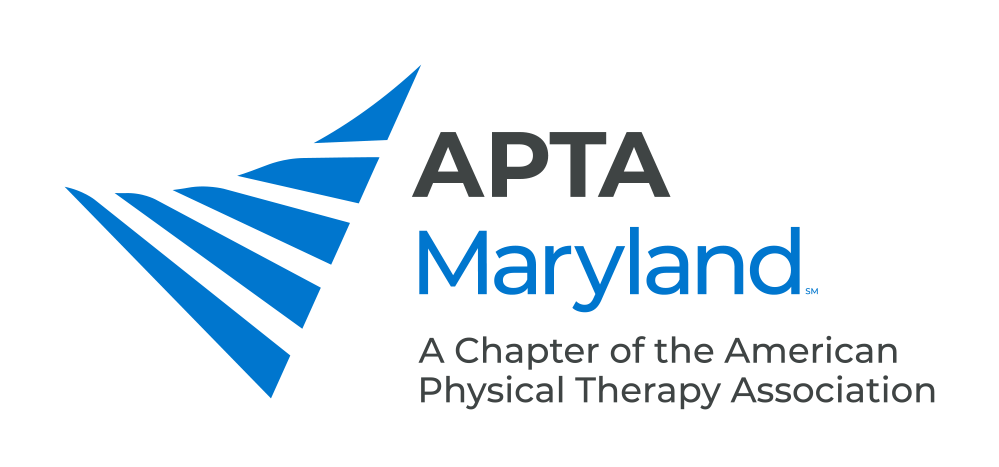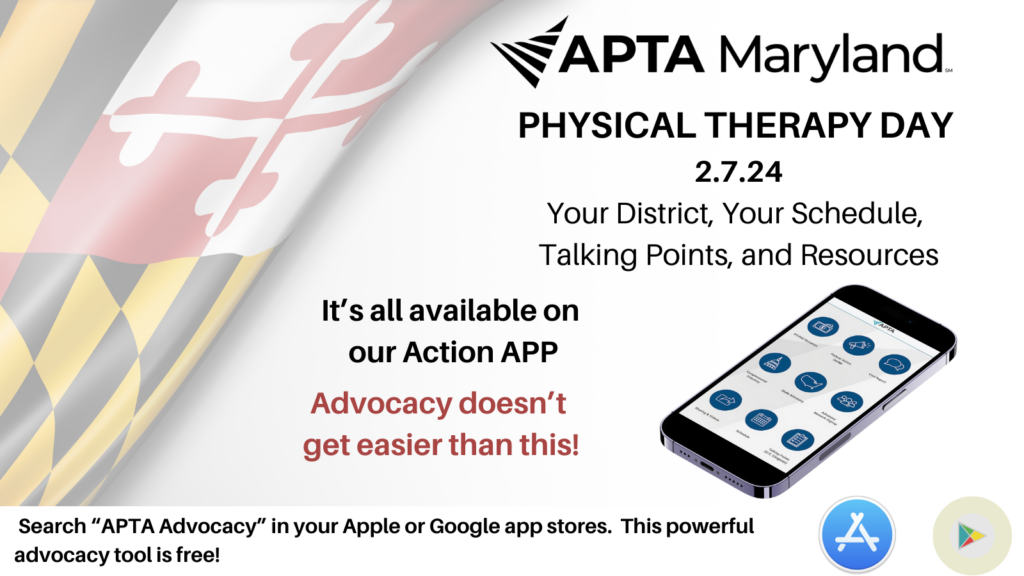Advocacy Day Information
Be a champion for the profession!
Protecting patient care and the physical therapy profession requires advocacy and we need your voice in Annapolis.
Our BIG Event is February 7th!
Top Issues
Sharing The Economic Value of Physical Therapy and our Bill on Prior Authorization Reform
Together we are stronger
(Bills & Legislation)
Legislator Feedback
Schedule
8:00 am Briefing, Bagels and Coffee at Calvary United Methodist Church (301 Rowe Blvd., Annapolis, Maryland 21401)
Appointments will start at 9:00 am and run through noon.
Briefing Packets
When you arrive, you will each be given a briefing packet with information on 2024 legislative issues and talking points, materials to leave with legislators about our profession, and pre addressed and stamped thank you notes for you to write your legislators.
Dress: Professional but wear comfortable walking shoes
Travel: For students – set up carpools with classmates.
Parking: Navy Marine Corps Stadium which is located off Rowe Boulevard between Farragut Road and Taylor Avenue. You can walk to the church from there and then after the briefing everyone will walk over to the legislature. Cost is $10/day
Note: There is NO parking at the church
(Bills & Legislation)
The Maryland General Assembly is a 90 day session that runs from January 10-April 8, 2024. Throughout the 90-day session the Chapter and our lobbying team work to promote our goals, objectives and point of view on the issues important to our profession and the communities we serve.
The Maryland legislative committees that address health and insurance related issues are:
- House of Representatives Health and Government Operations Committee (HGO)
- Senate Finance Committee (Finance)
APTAMD is part of a coalition that has drafted new legislation to address administrative burden and delays with prior authorizations.
- Health Insurance – Utilization Review – Revisions (SB791 |HB0932)
- Status
In the Senate – Hearing 2/21 at 1:00 p.m.
In the House – First Reading Health and Government Operations - Synopsis
Altering and establishing requirements and prohibitions related to health insurance utilization review; altering requirements related to internal grievance procedures and adverse decision procedures; altering certain reporting requirements on health insurance carriers relating to adverse decisions; and establishing requirements on health insurance carriers and health care providers relating to the provision of patient benefit information.
This legislation will improve the prior authorization process by adding transparency, aligning standards and increasing accountability of the insurers See APTA Infographic.
Health insurance carriers engage in a process known as “utilization review,” which is a system where the carrier reviews a practitioner’s request that a patient receive a certain health care service to determine if the service is medically necessary. The two most common types are “prior authorization,” which is requesting approval in advance from the carrier and “step therapy,” where the patient must try and fail on other medications (often less expensive) before “stepping up” to another medication.
This legislation would reform prior authorization by:
- Require evidence-based, peer reviewed criteria as the standard of care developed by an organization that works directly with health care providers or a professional medical specialty society.
- Mandate that a physician which made or participated in the adverse decision notify the insured’s physician or health care practitioner prior to making the adverse decision and be available to discuss the basis for the denial and the medical necessity of the health care service rather than deny care and then allow for a peer-to-peer meeting after the fact.
- Study how to standardize electronic systems across all carriers (rather than each carrier having their own system) with the same data points and using a single point of entry, such as CRISP.
- Study the feasibility of implementing a “gold card” standard in Maryland, which would exempt health care practitioners who meet certain standards from prior authorization standards.
The Data –Ultimate Outcome of Denied Claims
■ 13.08% of filed claims are denied
■ 66.14% of denied claims are appealed
■ 52.34% of appealed denials are overturned
Sponsors
House of Representatives: Delegate Bonnie Cullison Assigned to: Health and Government Operations
Senate: Senator Katherine Klausmeier Assigned to: Senate Finance Committee
Legislator Feedback
Keep Us Informed of Any Meetings or Communication with Legislators
Meeting with your legislator can be a powerful way to get your message across, as well as to listen to any health care related questions or concerns your legislator may have. It is a great way to build a relationship between APTA of Maryland and the legislator. Please consider contacting the Chapter first for more detailed information prior to your meeting including current cosponsors or existing relationships with your legislator.
Action APP
With APTA’s Action APP you can view talking points, learn about your legislators. You can even send letters to your legislators and donate to the Maryland PT-PAC from the app. Search “APTA Advocacy” in your Apple or Google app stores. This powerful advocacy tool is free.
Once you open the app, select state advocacy and scroll down to Maryland. It’s that easy!
Share your Story
From the Power of Physical Therapy to Navigating Insurance Challenges – APTA Maryland wants to help share your story with legislators. Please use the form below to upload testimonials and videos from patients and or practice owners.
Legislation Action Center
APTA members can login to send prewritten letters to their legislators. The Legislative Action Center contains letters for current state and federal issues. Members can also find practice visit resources and a schedule of local town hall meetings with their legislators under the “Grassroots Resources” tab.
Patient Action Center
Patients and nonmembers can send prewritten letters to their members of Congress. The Patient Action Center contains letters focused on the patient impact of certain federal issues and bills. Learn more about the benefits of physical therapy at ChoosePT.com.
The APTA Maryland annual physical therapy advocacy day in Annapolis was created to help connect our physical therapy professionals and students with their legislators, and to mentor a new cadre of advocates.
We all have a story and experiences to share. We don’t all have to know the ins and outs of advocacy and politics. The important thing is to make a connection with your legislators, so they understand our priorities as a profession.
Advocacy Day Goals
Educate the legislators on issues of importance to physical therapy professionals and their patients
- Begin what may develop into a long term professional relationship between legislators and physical therapy professionals and students
- Empower students and new professionals to engage in conversation with legislators
What you can do as your groups’ mentor to enhance the advocacy experience - Model professionalism
- Encourage the members in your group to do the talking and fill in as needed
- Recognize you may have a mix of PT and PTA professionals and students
- Recognize students and new professionals anxiety and discomfort
- In between appointments: go into session and observe proceedings; take a tour of the state house; write thank you notes to legislators and their staff;
Your Legislators Want to Hear from You
Advocacy Toolkit
Free Webinar for Members and Lobby Day Participants:
Becoming a Life Long Advocate for the Profession
Earn one (0.1) CEU with this online course. It is vital that PTs, PTAs, and students of physical therapy make a connection with their legislators, so they understand our priorities as a profession. This includes the importance of advocating for policies that address social determinants of health with effect patient outcomes. This course will teach you:
1. How and where to communicate with legislators 2. How to create a long term professional relationship with your legislator
3. Tips for Meeting with legislators
4. The impact of social determinants of health on the communities we serve
5. Advocacy to remove barriers to care
Get informed. Familiarize yourself with current issues and legislation affecting the physical therapy profession in Maryland. Think about how you might start a conversation with your representative. Why is it important for PTs and PTAs to support this piece of legislation? Fact sheets regarding bills and legislative efforts for Advocacy Day are below and will be available in your advocacy day packets.
- Learn about the Chapter’s priorities and the basics of advocacy through our on demand course (free for members)
- Find your District Legislator
- Join legislative committee meetings to learn about the issues, get talking points, etc.
- We will also provide briefing packets to anyone meeting with their legislator on behalf of the chapter and profession.
- Find your State Legislators (This link takes your to the APTA Legislative Action Center)
- Join the APTA Advocacy Network
Receive action alerts and updates on legislative and regulatory activity. It’s free for members!
Onsite – Annapolis
- Bring a photo ID. At the capital you may be asked to present a photo ID. Please remember that we will be going into a government building and may be asked to wait in lines at security.
For District and Virtual Meetings
- Dress appropriately. Business attire is expected as we will be representing the profession when we speak with state legislators.
- Your legislator may be in session or pulled to another meeting, do not be discouraged.
- Be Informed – Review our talking points
- Research your legislator – do they have a history of supporting the profession and issues we value. If not, research opposing arguments to any issues you pan to discuss and be prepared to explain your position
- Be respectful
- Be on time
- Capture the moment – take a photo and upload to social media. Tag the chapter and your legislator!
- Send a Thank You. Include a photo from your visit if you took one at the meeting. We will send you their email and office address the day of the event.
- Fill out our debrief form and let us know if the Chapter can provide any follow up information. You can also e-mail or Call the APTAMD to let us know how your visit went.
Sample Invitation Letter
How to Prepare
- Be Informed – Review our talking points
- Research your legislator – do they have a history of supporting the profession and issues we value. If not, research opposing arguments to any issues you pan to discuss and be prepared to explain your position
- Be respectful
- Be on time
- Capture the moment – take a photo and upload to social media. Tag the chapter and your legislator!
- Send a Thank You. Include a photo from your visit if you took one at the meeting.
- Follow up. Be sure to follow up on your ask and on any requests for additional information.
- Fill our our debrief form and let us know if the Chapter can provide any follow up information. You can also e-mail or Call the APTAMD to let us know how your visit went.



